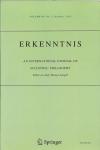
"Panqualityism, Awareness and the Explanatory Gap"
According to panqualityism, a form of Russellian monism defended by Sam Coleman and others, consciousness is grounded in fundamental qualities, i.e. unexperienced qualia. Despite panqualityism’s significant promise, according to David Chalmers panqualityism fails as a theory of consciousness since the reductive approach to awareness of qualities it proposes fails to account for the specific phenomenology associated with awareness. I investigate Coleman’s reasoning against this kind of phenomenology and conclude that he successfully shows that its existence is controversial, and so Chalmers’s critique is inconclusive. I then present a critique of panqualityism that avoids this controversial posit, arguing that the panqualityist treatment of awareness faces an explanatory gap, failing to account for the intimate cognitive access to qualities which we are afforded, i.e. for our ‘strong awareness’ of qualities. The real worry for panqualityists is thus not the contested phenomenology of awareness, which Chalmers relies on, but rather the special way in which we are aware of qualities.

“Le débat entre Leibniz et Clarke sur la détermination de la volonté”
(“The Leibniz-Clarke Debate on the Determination of the Will”)
This subject is commonly viewed as highly important for an adequate understanding of at least two important themes in Leibniz: his notion of the principle of sufficient reason, and his stance on the nature of space. The problem is located and examined within its historical and philosophical context. The paper was accepted for publication in a special journal issue.
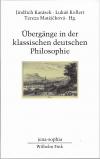
“Hegel gegen Spinoza. und gegen Hegel: Hegels späte Kritik an der Substanzphilosophie und sein eigener Übergang von der ‘Substanz’ zum ‘Subjekt’”
(“Hegel against Spinoza ... and against Hegel. Hegel’s Late Criticism of the Metaphysics of Substance and His Own Transition from ‘Substance’ to ‘Subject’”)
The chapter analyses Hegel’s reception of Spinoza and shows how Hegel integrated subjectivity in a Spinoza-style metaphysics at the end of his Jena period. It is part of the author’s long-term book-project on the development of Hegel’s dialectical method.
In: Karásek, J., and Kollert, L., and Matějčková, T. (eds.), Übergänge in der klassischen deutschen Philosophie. Leiden: Wilhelm Fink, 2019, pp. 169–192.
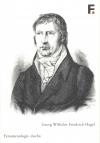
Georg Wilhelm Friedrich Hegel, Fenomenologie ducha
(Georg Wilhelm Friedrich Hegel, The Phenomenology of Spirit)
This work, which was conceived by Hegel as an introduction to his philosophical system and, at the same time, as its justification, grew into a unique presentation of the system itself. It influenced European intellectual history and philosophical learning in various subject-areas. The translation draws on the academic edition of 1980, taking from it notes, which are complemented by the classical notes of Georg Lasson, as well as by the translators’ own notes. The translation has developed out of an originally-projected critical revision of Jan Patočka’s 1960 translation.
This publication received an award for best translation of a scientific book from the Academia publishing house in 2020.
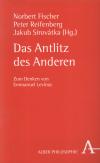
Das Antlitz des Anderen. Zum Denken von Emmanuel Levinas
(The Face of the Other: On the thinking of Emmnanuel Levinas)
Levinas develops his fundamental philosophical considerations from the concrete encounter with the other, who in his radical otherness places an ethical demand on the ego. This claim is particularly evident in the face and gaze of the other. Thus the “face of the other” belongs to the central figures of thought of Levinas’ philosophy. This anthology unfolds the core motif of the “face” in different directions (e. g. in conversation with philosophical tradition) and at the same time shows its effect in various fields: in art or in the “political”.
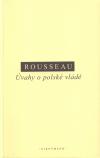
Jean-Jacques Rousseau, Úvahy o polské vládě a o její zamýšlené reformě
(Jean-Jacques Rousseau, Considerations on the Government of Poland and on Its Projected Reformation)
Considerations on the Government of Poland is the last political work by J.-J. Rousseau, it was published for the first time only after his death. Rousseau wrote the Considerations in a response to the request of the members of the revolted Polish nobility to propose a reform of the Polish Constitution. In this work Rousseau discusses the possibility of the survival of the Polish nation face to the disappearance of the Polish state. In this regard, Rousseau anticipates the national movements and demonstrates the originality of his political thought. The numerous references to the Social Contract contained in the Considerations prove the unity of his political theory as well as the strength and ardour of his convictions even in his last years. The book contains the notes of the author and the translator as well as the index, bibliography and a short survey of political the situation in the 18th century Poland. This is the first Czech translation of this work.
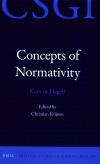
Justification of the State: Kant and Hegel
In: Ch. Krijnen (ed.), Concepts of Normativity: Kant or Hegel?
Both Kant and Hegel are convinced that the state is essential for human coexistence and cannot be replaced by another institution. Their justification of the state and their understanding of it does, however, differ. Kant is a theorist of natural rights and social contract, while Hegel is known as a critic of both of these theories and a theorist of an ethical state. Chotas explains what these two claims actually mean and in what respects do they contradict each other. He considers also their consequences for the notion of the state within a broader context of philosophy of these two thinkers.
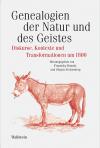
“Bildung des Menschen und Bildung des Geistes bei Hegel: Eine Erörterung mit Blick auf den Humanismus (Humboldt und Herder)”
(“Bildung [cultivation] of Man and of Spirit in Hegel: Discussion with a View to Humanism [Humboldt and Herder]”)
This chapter analyses Hegel's concept of Bildung (cultivation) and shows its differences from the well-known and popular concept found in Humboldt and Herder. The chapter builds on the author’s longstanding interest in all issues concerning Bildung and the theory of the modern university.
In: Bomski, F., and Stolzenberg, J. (eds.), Genealogien der Natur und des Geistes: Diskurse, Kontexte und Transformationen um 1800. Göttingen: Wallstein Verlag, 2018, pp. 257–272.

“Benjamin Constant and the Ideas of Republicanism”
The article was published in a monothematic issue on Republicanism. In contrast to the standard interpretation of Constant’s political theory as purely liberal, the author argues that an interpretation of Constant’s understanding of politics must take into account the ideas he expressed in De la religion. It is claimed that Constant develops the ideas of civic Republicanism by emphasising morality (based on our passions) and civic engagement as the chief means of preserving human liberty.
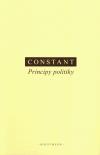
Benjamin Constant, Principy politiky
(Benjamin Constant, Principles of politics)
The translated book is the key political work of the Swiss-French political writer and politician Benjamin Constant (1767–1830). Constant considers here the impact of the French revolution on political thought. The present publication is the translation of the manuscript version of the book (1806) that Constant could not publish at the time due to political reasons. This version of the book confirms him as a key representative of classical Liberalism.




